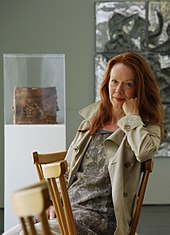Gabriele Hasler
Gabriele Hasler (born April 18, 1957 in Wiesbaden ) is a German singer, multi-instrumentalist and composer .
Live and act
Hasler, who grew up in Stuttgart and completed a teaching degree at the University of Bremen (German / Music) from 1977 to 1983 , was a singer in bands of different genres (folk, rock, Neue Deutsche Welle) from 1977. After training at Berklee College of Music between 1981 and 1983, she initially dealt intensively with jazz and improvised music. Today she is a cross-genre musician who can best be assigned to jazz. In 1986 she was the first woman to receive the SWF Jazz Prize and founded her own record label "Foolish Music", on which she has released 18 releases so far (2018). She ran numerous artistic projects such as the "Foolish Heart" quartet as well as formations that initially existed as a duo with the poet Oskar Pastior and the saxophonist Roger Hanschel .
As a soloist, Hasler was involved in various radio and television productions, for example in Claus Bantzer's "Open your mouth for the mute" (for chamber choir, jazz ensemble and solo voice, NDR 1993), in Bernd Konrad's "Strange Fruit" (for symphony orchestra, jazz ensemble and Solo part, SWR 1995) as well as with Dietmar Bonnens “Saxosythes” (chamber choir and solo part, German Chorfest Bremen, Radio Bremen 2008). She also worked with the big bands of SDR, NDR, WDR and Danish broadcasting. She was also involved in projects by Georg Ruby , Jörn Schipper and Ursel Schlicht .
Hasler also released on Thein Records, Leo Records , JazzHausMusik , Bear Records and Laika Records . With her long-standing quartet Foolish Heart , she has made guest appearances at numerous festivals and has toured the Maghreb, South Asia, Turkey and Togo for the Goethe-Institut . She wrote commissioned compositions a. a. for the NDR (“sonetburger”), the Mutare Musiktheater (“crossfade”), for the children's choirs of the St. Petridom Bremen (“The Hour of the World”), for the Darmstadt concert choir (“frogs and tea bags”) and the Harvestehude chamber choir ( "Study Nature").
Musical approach
Playful use of human language is central to Hasler's musical work. The purely tonal aspect of words often overlaps their actual level of meaning. In her compositions she sometimes uses her own fantasy language, which she calls "Esperango". Her work includes arrangements of classical jazz standards as well as settings of poems by Pastior or by Gertrude Stein ( Go In Green ). In addition, she used John Dowland's Lovesongs Early Music CD .
Teaching activities
Hasler worked for many years as a lecturer in jazz singing at the University of Oldenburg and then at the Frankfurt University of Music . She pursues her concept of vocal group improvisation with “sound baths”, the improv choir Bremen (2012 to 2016) and with “Luftschubsen” (since 2016).
Discography (selection)
- Crazy (1984) (quintet)
- God Is a She (1986) (with Bob Degen , Manfred Bründl and Jörn Schipper)
- THE PROJECT (1988) (with quintet)
- Gabriele Hasler's Personal Notebook (1990) (quintet, with Lars Lindvall )
- sonetburger (1993) (with Elvira Plenar and Willers)
- Spider's Lovesong (1995) (with Ruby)
- Go In Green (1995) (with Hanschel)
- Gabriele Hasler's Rose Pieces (1997) (septet)
- Familienglück (1997) (with Hanschel and Hans Lüdemann )
- Pigeon (2002) (with Hanschel)
- Lovesongs (2003) (with Hanschel)
- Flow (2004) (solo)
- Frogs and Tea Bags (2006) (with Pastior and Hanschel)
- G.bete 365 (2007) (solo)
- In the belly of the vocal (2013) (solo; best list 4/2013 for the German Record Critics' Prize )
- Fundstücke (2016) (with Günter Baby Sommer )
As a guest musician (selection)
- The Private Ear (1989, with Willers and Louis Sclavis )
- Pago Libre: Extempora (1990, with Lars Lindvall , John Wolf Brennan and Daniele Patumi )
- Strange Loops (1992 with Ruby and Wollie Kaiser )
- Solitude (1993, with German Marstatt and Wollie Kaiser)
- OrganIC VoICes (1994, with John Wolf Brennan)
- Strange Fruit (1998, with Konrad, Herbert Joos , Günter Lenz , Günter Sommer and the Südwestdeutsche Philharmonie )
Web links
Individual evidence
| personal data | |
|---|---|
| SURNAME | Hasler, Gabriele |
| BRIEF DESCRIPTION | German singer, multi-instrumentalist and composer |
| DATE OF BIRTH | April 18, 1957 |
| PLACE OF BIRTH | Wiesbaden |

